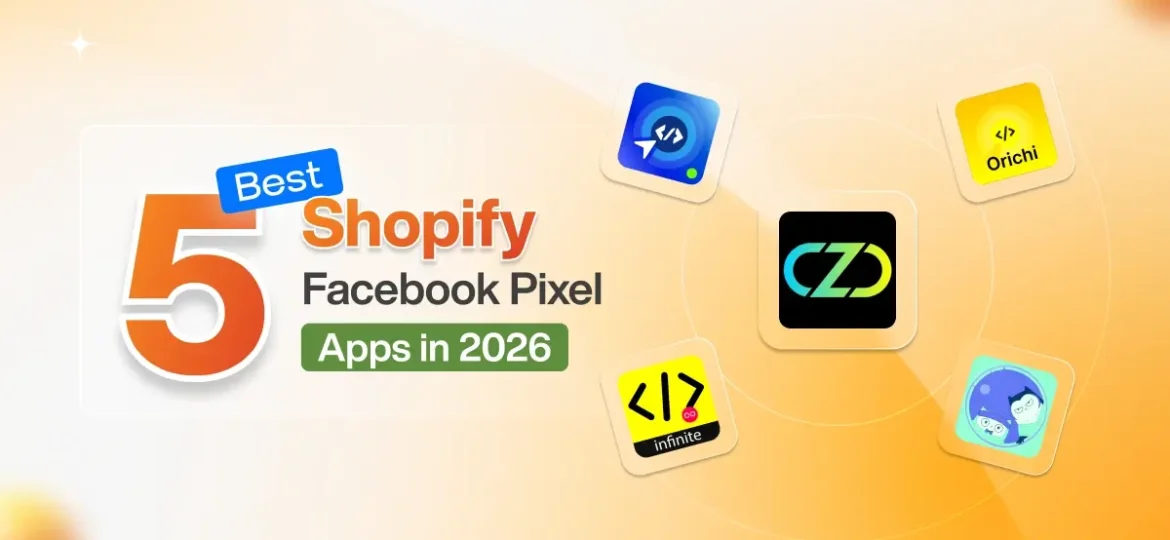
Last Updated on February 16, 2026
InScaling a Shopify store with Facebook ads is no longer about spending more; it’s about tracking better, now.
The Facebook Pixel is still the core of Meta advertising, helping merchants understand customer behavior, track real conversions, and optimize ad spend with confidence.
But privacy-first changes, such as iOS 14+ App Tracking Transparency and browser tracking limits, have made Pixel-only setups less reliable. Many stores now miss key data across the customer journey, leading to poor attribution and wasted spend.
As a result, Shopify merchants face:
- Tracking gaps: missing key funnel events
- Attribution issues: unclear paths from ads to sales
- Rising costs: inefficient spending due to weak data
That’s why, in 2026, you need to rely on Facebook Pixel apps that integrate Conversion API (CAPI), support multiple ad platforms, and deliver more accurate tracking.
👉 The right Pixel app turns guesswork into confident growth.
Table of Contents
Evaluation Criteria: How We Ranked These Apps
To make this list truly valuable for Shopify merchants, we applied a clear set of criteria when evaluating each Facebook Pixel app:
- Accuracy of Tracking & CAPI Integration
We prioritized apps that deliver reliable event tracking and support Facebook’s Conversion API to overcome iOS 14+ restrictions. - Ease of Setup & Usability
The best apps should work seamlessly with Shopify, requiring minimal technical knowledge while offering advanced customization for power users. - Multi-Channel Integration
Since most merchants advertise across multiple platforms, we gave extra weight to apps that also support TikTok, Google, and other ad networks. - Pricing & Customer Support
Affordable plans and responsive support are critical for merchants of all sizes, especially when troubleshooting tracking issues.
👉 With these benchmarks in mind, let’s dive into the Top 5 Shopify Facebook Pixel Apps in 2026.
Top 5 Shopify Facebook Pixel Apps in 2026
1. ZoTek: Facebook Pixel & TikTok Pixel
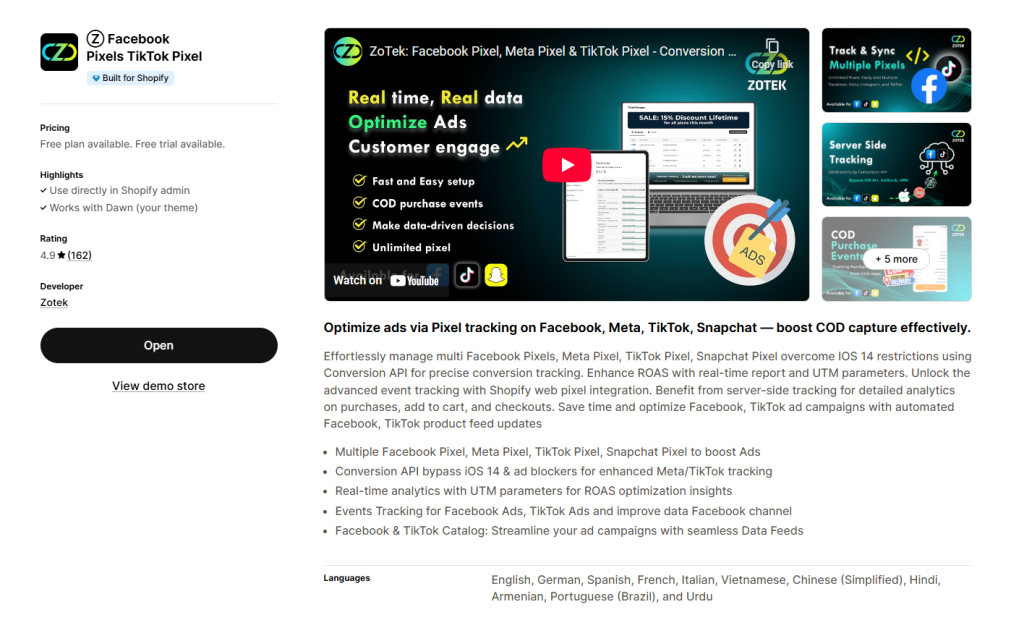
When it comes to precision tracking and adaptability in 2026, ZoTek is a solid option for Shopify merchants. With its combined Facebook Pixel, TikTok Pixel & Snapchat Pixel integration, the app makes it easier to track and optimize campaigns across multiple channels, helping store owners maintain reliable data without relying on multiple separate tools.
Key Features
- Seamless integration with Shopify (no coding required).
- Facebook Conversion API (CAPI) supports bypassing iOS 14+ data loss.
- Dual tracking: Facebook + TikTok Pixel in one app.
- Advanced event tracking (Add to Cart, Checkout Initiated, Purchase, custom events).
- Unified dashboard with cross-channel performance insights.
Pros:
- Easy Shopify integration; no coding required.
- Supports both Facebook Pixel, TikTok Pixel & Snapchat Pixel in one app.
- Accurate server-side tracking via Facebook Conversion API (CAPI).
- Reliable data tracking even under iOS 14+ restrictions.
- Custom event tracking: ViewContent, AddToCart, Purchase, and more.
- Automatic product feed updates for Facebook, TikTok & Snapchat.
- Create and manage product catalogs.
- Affordable pricing compared to using separate Pixel apps.
Cons:
- Currently supports only Facebook, TikTok, and Snapchat, with plans to expand to Google, Twitter, and Pinterest.
Pricing:
Free plan available; paid plans typically $12.99/mo, $29.99/mo, and $69.99/mo with a 7-day free trial.
2. Trackify X
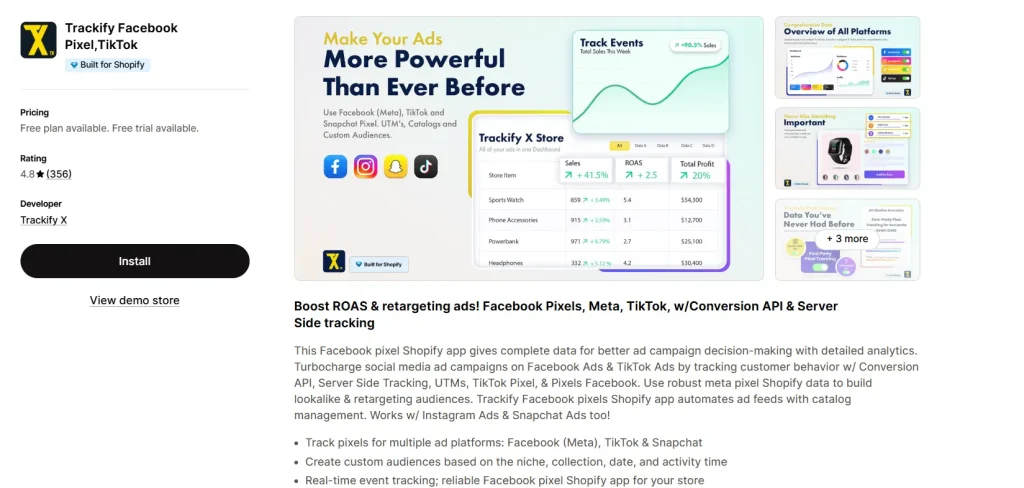
Trackify X is a Shopify app designed to help merchants accurately track and optimize their advertising performance across Meta (Facebook & Instagram), TikTok, and Snapchat. It focuses on reliable pixel tracking and data accuracy to improve retargeting and ROAS.
Key Features
- Advanced Meta, TikTok & Snapchat pixel tracking
- Server-side tracking for improved data accuracy
- Multiple pixel and event management
- Conversion API (CAPI) support
- Real-time event tracking and diagnostics
Pros
- Improves ad attribution accuracy
- Easy setup for Shopify merchants
- Supports multiple ad platforms
Cons
- Best suited for merchants actively running ads
Pricing
Free plan available with basic tracking. Paid plans start at $8.99/month for unlimited pixels and analytics, with Grow ($18.99) and Advanced ($28.99) options offering premium features and 24/7 support. All plans include a 7‑day free trial.
3. OC Meta Pixel: Facebook Pixels
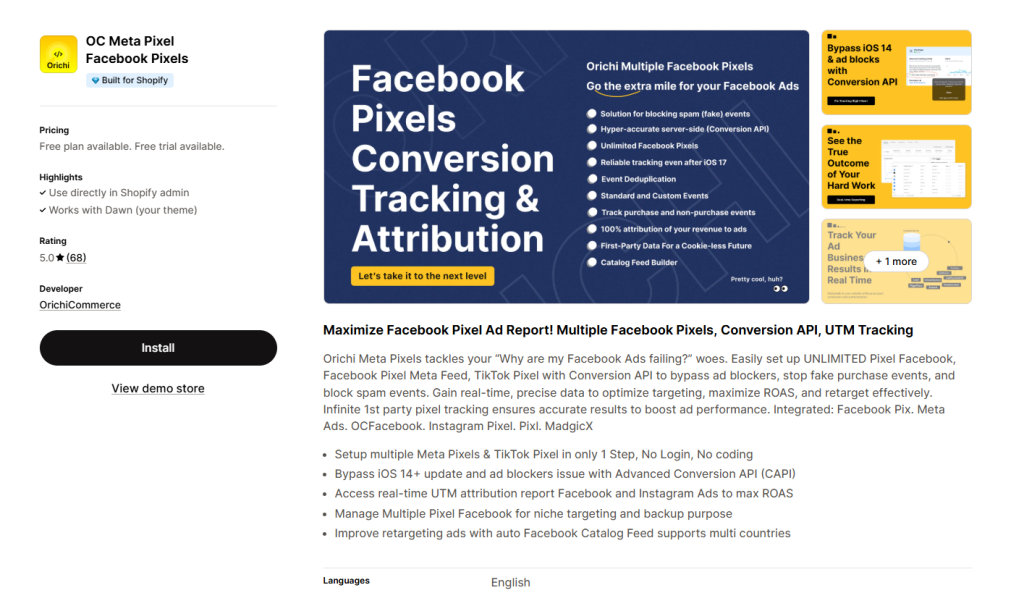
Pros:
- Multiple Pixel Support: Set up unlimited Facebook & TikTok Pixels in just one step.
- Conversion API (CAPI) integration: Helps bypass iOS 14+ tracking restrictions and improves event accuracy.
- Advanced Spam & Fake Event Filtering: Prevents fake purchases and spam events from polluting data.
- First-Party Pixel Tracking: Ensures more reliable and precise attribution results.
- Real-Time UTM Reporting: Get accurate campaign attribution data to optimize ROAS.
- Catalog Feed Integration: Supports automatic Facebook Catalog feeds across multiple countries for remarketing.
- Ease of Use: No login, no coding required; setup is quick and beginner-friendly.
Cons:
- Advanced reporting may feel overwhelming for beginners unfamiliar with UTM or multi-pixel tracking.
- Occasional learning curve for merchants who are not tech-savvy, especially when managing multiple pixels and catalogs.
- Dependence on Facebook’s frequent updates — some users report temporary bugs or delays when Meta changes its API.
Pricing:
Free plan available; basic functionality is free. The Paid plan starts with $14.99/month and goes up to $24.99/month for the advanced plan.
4. Omega: Facebook Pixel & Meta Feed
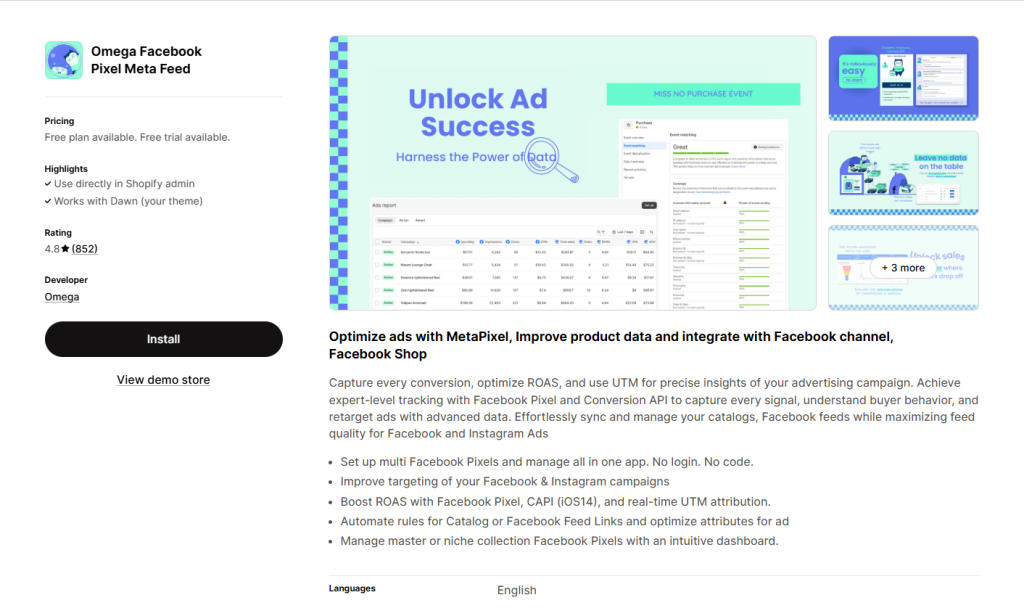
Pros:
- Multi-Pixel Management: Easily set up and manage multiple Facebook Pixels in one place without coding.
- Conversion API (CAPI) support: Helps bypass iOS 14+ restrictions and improves tracking accuracy.
- UTM tracking & real-time attribution: Provides detailed campaign performance insights to maximize ROAS.
- Catalog & feed automation: Automatically syncs product catalogs and optimizes feed attributes for Facebook & Instagram Ads.
- Flexible pixel setup: Manage both master and niche collection pixels with an intuitive dashboard.
- Improved retargeting: Enhances targeting and remarketing by capturing detailed buyer behavior.
- Free plan available + free trial.
Cons:
- Primarily focused on Facebook & Instagram — lacks broader multi-channel integration (e.g., TikTok, Google Ads).
- Advanced features may be overkill for beginners who just need a simple pixel setup.
- UTM attribution setup can be complex for non-technical users.
Pricing:
A free plan is available; paid plans are $20.99/mo, $35.99/mo, and $45.99/mo (with a 3-day free trial).
5. Facebook Pixel: TikTok Pixel
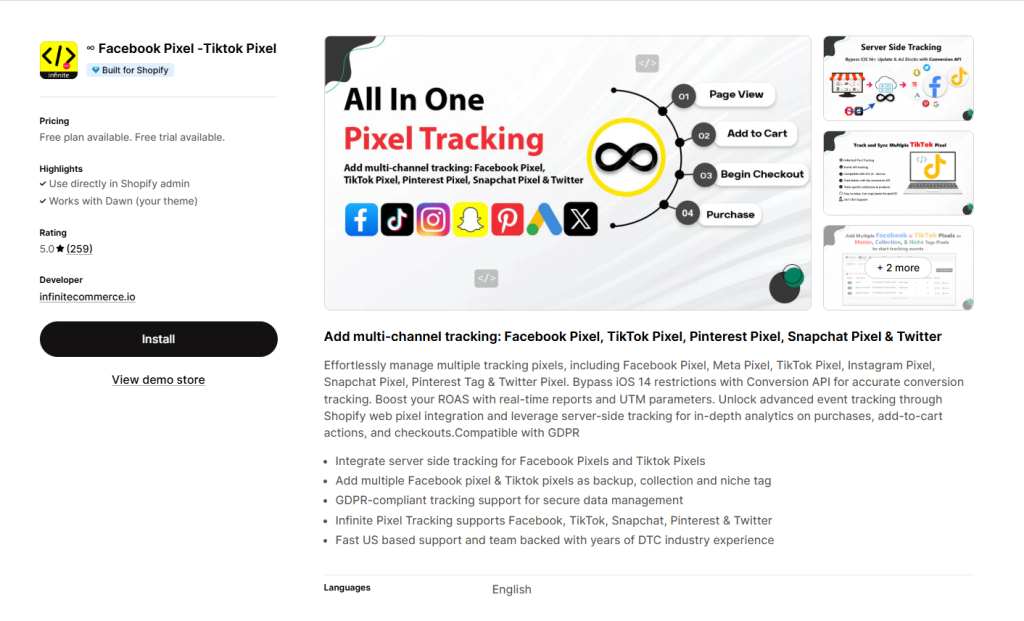
Pros:
- Multi-channel tracking: Supports Facebook, TikTok, Snapchat, Pinterest, Instagram, Twitter, and Meta Pixel in one app.
- Server-side tracking with CAPI: Helps bypass iOS 14 restrictions for more accurate attribution.
- Advanced event tracking: Monitors key actions like PageView, Add to Cart, Checkout, and Purchase in detail.
- Multiple pixel management: Add master, collection, or niche-level pixels for better segmentation.
- GDPR-compliant: Ensures data security and compliance with global privacy standards.
- Real-time reporting with UTM tracking: Improves insights into ad performance across multiple channels.
- Strong customer support: US-based team with direct-to-consumer (DTC) industry experience.
- Free plan + free trial available.
Cons:
- Interface may feel overwhelming for beginners due to its multi-platform features.
- Primarily focused on tracking only; lacks advanced catalog or feed automation (unlike some competitors).
Pricing:
Free plan available; paid plans $6.99/mo, $9.99/mo, and $19.99/mo with a free trial.
Final Thoughts
As Shopify advertising gets more competitive in 2026, relying on the Facebook Pixel alone just isn’t enough. Privacy changes like iOS 14+ and ongoing tracking restrictions have created data gaps that hurt performance.
That’s why more merchants now use smart Facebook Pixel apps to recover lost data, improve attribution, and optimize campaigns with confidence.
The takeaway you get from this blog?
Better tracking leads to better decisions, and better decisions lead to higher profits.
Choosing the right Pixel app isn’t just a technical upgrade; it’s a growth advantage.

